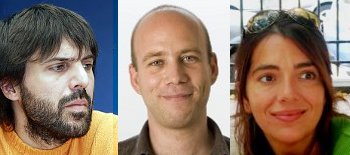In depth
Communication and armed conflicts

Pablo Aguiar, Xavier Alcalde i Cèlia Cernadas
In the modern world, the media play a vital role. So much so, that it seems that what does not appear in the media does not exist, and that our worldview is highly conditioned by what the media shows us. They are often our only source of information. In the area of armed conflicts, this is most apparent ... and most unfair. It is for this reason that we decided that the relationship between the media and armed conflicts required an in-depth analysis.
Why do some conflicts never appear in the media? Why do some appear in the headlines for a while, before languishing on the inside pages and eventually disappearing? Recently, we witnessed the approval of the use of force by the United Nations in two very different situations almost simultaneously (Libya and the Ivory Coast), which have received very different media coverage. What are the criteria that the media use when covering some conflicts while "forgetting" others? What are the factors that determine whether a conflict is news? Those are some of the questions that Professor Xavier Giro attempts to answer in his article Strategic interests, journalistic battles and skirmishes.
Another aspect that we felt was important to cover first person narratives of journalism in armed conflicts. The difficult task of explaining the situation is even more complicated in a context of war, and even more so when the recession and restructuring of companies requires many professional journalists to work on a freelance basis. The political scientist and journalist Alberto Arce tells us from Misrata in Libya about the problems inherent in journalism arising in (and as a result of) the conflict in his article Journalism in conflict. Time, place and circumstances. It looks at the traditional role of the war correspondent from a twenty-first century perspective.
As mentioned above, the media shape reality, and portray it for us. It now seems clear that they are biased towards sensationalism and warmongering. However, would it be possible to produce another kind of journalism - A journalism that was based on the positive impact on the situation in terms of peace? That is the cornerstone of Corresponsales de Paz. One of its founders, Cristina Ávila, sets out a vision far removed from the status quo and is at the same time committed to her profession in her article Is it possible to shape a different world through journalism?.
The last two articles in the special feature cover issues relating to communication apart from journalism. First, focusing directly on the NGO sector, Montse Santolino looks at the relationship between the organised movement and communication of peace in her article What communication for peace do Catalan NGOs engage in?. This is the cornerstone of the pioneering study by a group of researchers at the Universitat Autònoma de Barcelona which we present here.
Second, we felt that a special feature on communication and conflict needed to make an effort to analyse the new forms of communication and their impact on the classic role of activist. Indeed, this was one of the areas that the ICIP wishes to use as a distinguishing feature and it was therefore essential to allocate an article to it. The journalist and cyberactivism expert Jodri de Miguel assesses the use and potential of social networks for social transformation, which recommending a search for balance between immediacy and reflection, in his article Cyberactivism for peace: between urgency and reflection.
Finally, if there was a worldwide survey about which journalists are the most committed to revealing the horrors of war, there is no doubt that Gervasio Sanchez would be included in many of the answers. The internationally renowned photo-journalist has just presented his Desapareguts [Missing] exhibition in Barcelona and is the subject of this issue's interview feature.
The magazine also contains opinion pieces by Marina Caireta on education for peace and listening, a reflection on the assassination of Osama Bin Laden by Pablo Aguiar, and the regular sections Finding out more, Recommended reading, ICIP news and international news.
Happy reading!